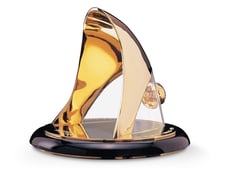Estimated Read Time: 7.5 minutes

There’s no secret code passed by ships late in the night or notes hidden behind a statue in an old city. It doesn’t take a spy or some intelligence gathering operative to figure out what clients want.
Though, sometimes it feels like it, doesn’t it?
But cracking the code to what clients want doesn’t mean that you need to be an expert safe breaker, just a bit of logic, creativity, and sales experience. Those are the tools of your trade.
So, in a much more legal and less-risky fashion, we’re going to take a look at the 11 signs that your customer wants a custom project.
Hint: they aren’t looking for the same projects and products as what’s being pitched and shown by everyone else. #ThanksCaptainObvious
But first, what is custom?
Custom is a different breed. It’s more than “insert logo here” on a stock piece and that’s it. Custom is high-end and completely from scratch. It takes more thought and care, but it also typically has a higher yield.

Pictured here is the process from the conversation and design phase to a mockup of the product for approval, and then to the finished product. That’s the custom approach we take – from a sketch on a blank sheet of paper to a fully custom and unique piece to best suit the needs of clients. It’s personal. We want to have a conversation with you to design from scratch the perfect award, display, or other project.
Want a more logo & go approach? Then click here for our more “stock” line, called DYR.
Alright, so now you know what custom is, which if you know anything about Bruce Fox, you know that custom is the embodiment of what we do and our artisan approach. But, let’s cut to the chase and plunge right into what you came here for, shall we?
11 Signs That Your Customers Are Looking for Custom
So, when you are having an in-person meeting with a customer or potential client, here are a few signs that they’re looking for custom; and don’t worry, they typically become glaringly obvious once you know what to look for.
1. They ask for something completely unique.
They’re asking for something that you’ve never shown them before. They don’t want the usual transactional products that you and everyone else have been shoving down their throats.
Bonus: if they push away your typical portfolio and look you in the eye asking for something a bit more unique– that typically means they have a pretty good idea of what they want.
2. They have a big budget.
Price will always be a factor, but the reality is also that custom is not always cheap. There’s no way that you’ll get a completely custom piece for only a few bucks per piece. So, if they mention that they have a big budget, it should be a sign to you that they are serious about their project and want something that is well worth it; especially if it’s high-quality and custom, which is understood and expected.
3. Keep adding more ideas and wants.
As your client piles on more wants, you’re dwindling out of “stock options” because the more specific they are, the more custom it will have to be. Hence, if it needs to be interactive, personalized, branded, company-culture intrinsic, and one-of-a-kind, then you’re out of the stock options, which are typically the first to be used. Instead, you can plunge headfirst into a custom project. So, you bring up custom and the wonders of letting them start from scratch instead of nit-picking and changing thousands of costly details.
4. A big-named company that wants a product that “suits their unique and high-level” needs.
If you’ve worked with those “big companies” before, then you know that they expect a certain level of quality, service, and uniqueness. That’s when custom comes into play, custom will fit their needs, wants, and requirements, all in the nice packaging that customers love to hear, “It’s completely unique and 100% custom tailored to you. It’s one-of-a-kind.”
5. Want something that is based off their product or an aspect that has to be created from scratch.
When a client comes in with their product, their baby, and says to recreate it for an award/trophy/display, there is typically a sense of fear. Where do you go for that? Their product can’t be just a “stock” product. The answer is custom. A company that can create a miniature, replica, or utilize the product must have custom capabilities and experience, especially when it comes to such an important subject and inspiration.
6. They have a good idea of what they want, but it’s not out there.
How often do you have clients that have already been shopping around? It’s not uncommon anymore, is it? When those people are coming to you because they have a completely unique idea and have no idea what to do, then that can mean one of two things. One is that they don’t have the connections and experience that you have. Or, they are looking for something more unique and custom to them and their needs. Be sure to ask questions to flesh out which side of the coin they are on.
7. When needing to bring to life an idea, an abstract phrase, or not a typical “physical” idea.
They want to embody leadership. Ok, that can be shown is a variety of ways, but when they ask for leadership that also embodies their company and values? That might not be so “stock.”
 What about when they ask for a three-dimensional interpretation of the quality continuum bell curve? That’s not something you’ll be able to pick up at any awards shop.
What about when they ask for a three-dimensional interpretation of the quality continuum bell curve? That’s not something you’ll be able to pick up at any awards shop.
Custom takes the inspiration and runs, starting from scratch and designing the wants, needs, and ideas into a single product.
8. Want it to fit into a room or area perfectly, needing specific measurements or color scheme.
If a room or area has already been designed, then the product needs to seamlessly blend in while also standing out. Whether it’s an Honor Wall, Donor Recognition, display, or custom trophy, it needs to fit the dimensions, design, “flow” of the space, color scheme, and other necessary requirements. And unless the room has a simple design and basic needs, then custom is the only way to satisfy the project requirements.
Bonus: if you’re working with an interior designer, you’ll make their day saying that it can be customized to their specs or needs.
9. Wanting the product to perfectly reflect or embody an event, project, product, or building.
“I don’t want a plaque that just is colored and says good job with a lot of flowery words and a name. I want something is an instant reminder on what it was for.” This is actually pretty common, even becoming more of a trend. If they want to give a replica of the building that was just constructed as a commemorative gift or bring to life the character from their successful marketing campaign, then custom is the only option.
10. Must be a “wow” statement piece.
Awards typically get smiles, claps, and a few wows, but it’s also a digital world. They’ve seen the wood plaques with their name on it or a marble pillar with a formal reminder of Years of Service. Boring.
What your customers are really looking for is something that fits their branding, messaging, topic or theme, and still be unique. Think outside the box. Look at their mascot, messaging and values, or even the location of the event; there are plenty of ways to meet all of their needs and requirements, while still creating a unique piece that’s sure to “wow” the audience.
Get inspired by checking out a small sampling of our work in our portfolio.
11. Want a high ROI.
Custom can have a ROI? Typically, yes. If you’re looking for a continuance of a specific action or for a high “stickiness factor” for a promotional product, then having a clear and obvious reminder of the deed well done (or other needs) will make a difference in recall and positive branding. Here is an interactive page to see how custom allows for each of the vital recognition aspects to shine.
For customers that are looking for proven factors, then custom means that the project can start from scratch with the goals in mind, be created to meet the needs, and then measured in a controlled way. When you start with a blank sheet of paper rather than something that’s 95% already finished, you’re more likely to have a more effective and successful outcome.
Custom means that it’s more personal to the brand and the recipients. Understanding the signs of a custom client means you can better serve your client, meet their needs, be the industry expert they are wanting, and even have that extra “wow” factor. Furthermore, besides the fact that your client wants custom, here are 5 reasons why custom is a good sign for you, too.
Want to learn more about our custom capabilities, get inspiration for your next project, learn more, or just want to reach out? We’re always here to help, just ask. We’re an agency-style manufacturing company, answering questions and creating conversations is an important aspect of what we do.
![]() Kristina Hublar is your friendly neighborhood Marketing Specialist at Bruce Fox, Inc., which means she is the person behind the keyboard for the social media, emails, website, and other marketing efforts. She’s new to Bruce Fox, but is an Indiana native. In her spare time, you’ll find her plotting her next road trip, bobbing along to music while crafting, spending time with loved ones, or with her nose in a book.
Kristina Hublar is your friendly neighborhood Marketing Specialist at Bruce Fox, Inc., which means she is the person behind the keyboard for the social media, emails, website, and other marketing efforts. She’s new to Bruce Fox, but is an Indiana native. In her spare time, you’ll find her plotting her next road trip, bobbing along to music while crafting, spending time with loved ones, or with her nose in a book.







